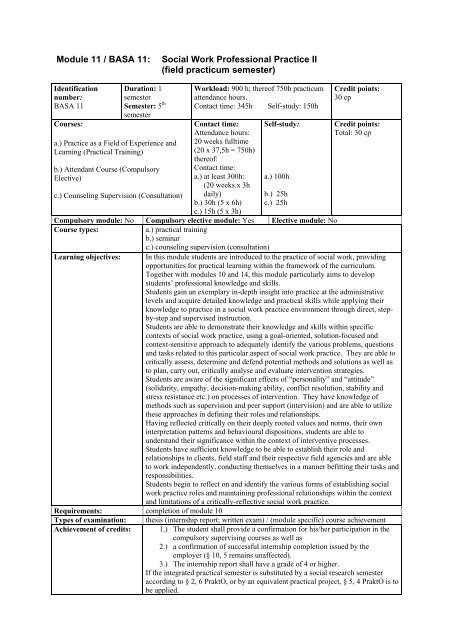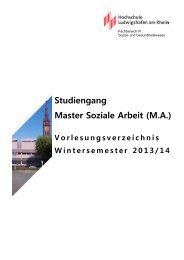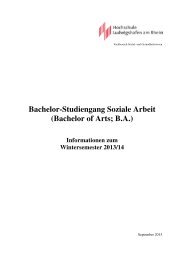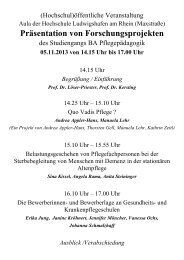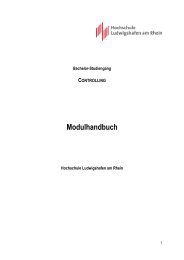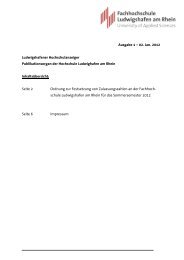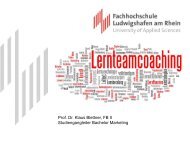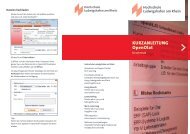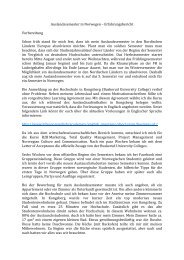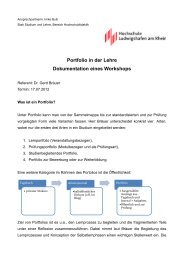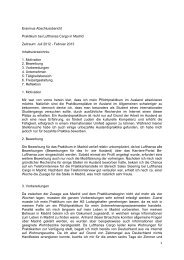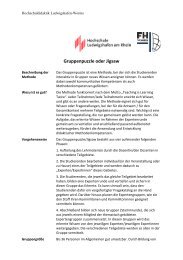Module Programme: Bachelor Social Work (BASA) Department IV ...
Module Programme: Bachelor Social Work (BASA) Department IV ...
Module Programme: Bachelor Social Work (BASA) Department IV ...
Create successful ePaper yourself
Turn your PDF publications into a flip-book with our unique Google optimized e-Paper software.
<strong>Module</strong> 11 / <strong>BASA</strong> 11:<strong>Social</strong> <strong>Work</strong> Professional Practice II(field practicum semester)Identificationnumber:<strong>BASA</strong> 11Courses:Duration: 1semesterSemester: 5 thsemestera.) Practice as a Field of Experience andLearning (Practical Training)b.) Attendant Course (CompulsoryElective)c.) Counseling Supervision (Consultation)<strong>Work</strong>load: 900 h; thereof 750h practicumattendance hours.Contact time: 345h Self-study: 150hContact time:Attendance hours:20 weeks fulltime(20 x 37,5h = 750h)thereof:Contact time:a.) at least 300h:(20 weeks.x 3hdaily)b.) 30h (5 x 6h)c.) 15h (5 x 3h)Self-study:a.) 100hb.) 25hc.) 25hCompulsory module: No Compulsory elective module: Yes Elective module: NoCourse types:a.) practical trainingb.) seminarc.) counseling supervision (consultation)Credit points:30 cpCredit points:Total: 30 cpLearning objectives: In this module students are introduced to the practice of social work, providingopportunities for practical learning within the framework of the curriculum.Together with modules 10 and 14, this module particularly aims to developstudents’ professional knowledge and skills.Students gain an exemplary in-depth insight into practice at the administrativelevels and acquire detailed knowledge and practical skills while applying theirknowledge to practice in a social work practice environment through direct, stepby-stepand supervised instruction.Students are able to demonstrate their knowledge and skills within specificcontexts of social work practice, using a goal-oriented, solution-focused andcontext-sensitive approach to adequately identify the various problems, questionsand tasks related to this particular aspect of social work practice. They are able tocritically assess, determine and defend potential methods and solutions as well asto plan, carry out, critically analyse and evaluate intervention strategies.Students are aware of the significant effects of “personality” and “attitude”(solidarity, empathy, decision-making ability, conflict resolution, stability andstress resistance etc.) on processes of intervention. They have knowledge ofmethods such as supervision and peer support (intervision) and are able to utilizethese approaches in defining their roles and relationships.Having reflected critically on their deeply rooted values and norms, their owninterpretation patterns and behavioural dispositions, students are able tounderstand their significance within the context of interventive processes.Students have sufficient knowledge to be able to establish their role andrelationships to clients, field staff and their respective field agencies and are ableto work independently, conducting themselves in a manner befitting their tasks andresponsibilities.Students begin to reflect on and identify the various forms of establishing socialwork practice roles and maintaining professional relationships within the contextand limitations of a critically-reflective social work practice.Requirements: completion of module 10Types of examination:Achievement of credits:thesis (internship report; written exam) / (module specific) course achievement1.) The student shall provide a confirmation for his/her participation in thecompulsory supervising courses as well as2.) a confirmation of successful internship completion issued by theemployer (§ 10, 5 remains unaffected).3.) The internship report shall have a grade of 4 or higher.If the integrated practical semester is substituted by a social research semesteraccording to § 2, 6 PraktO, or by an equivalent practical project, § 5, 4 PraktO is tobe applied.


